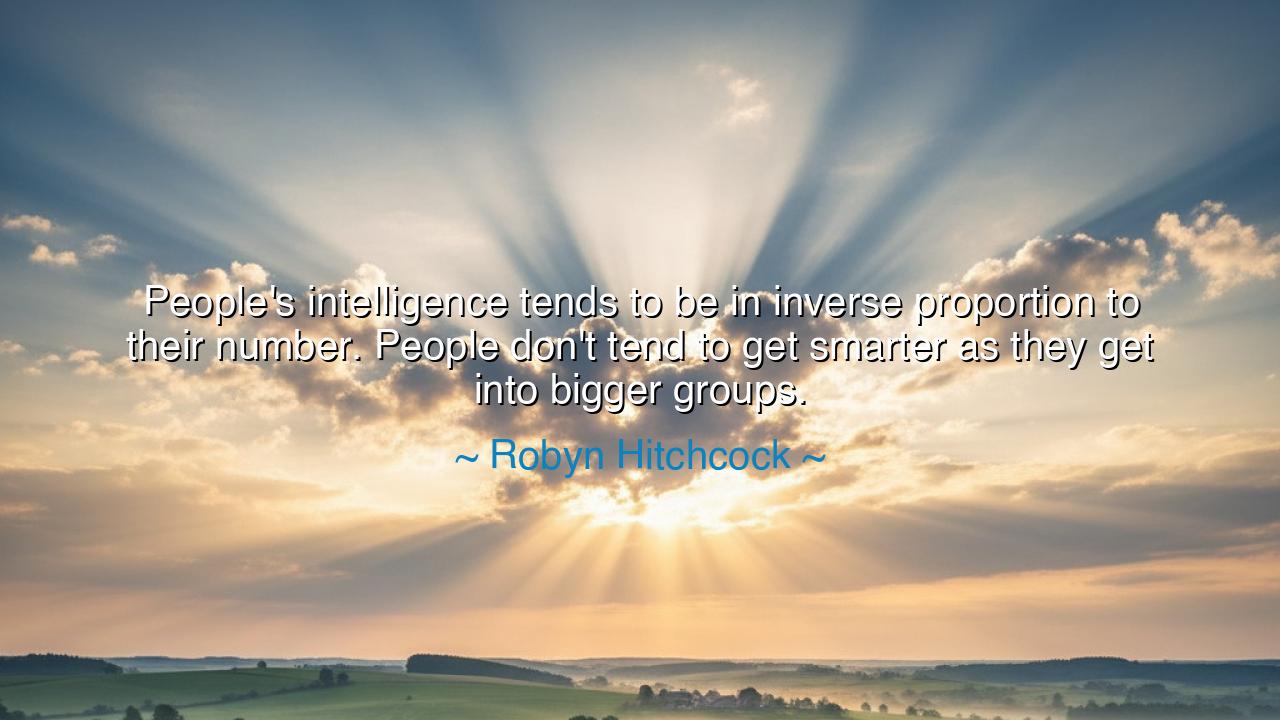
People's intelligence tends to be in inverse proportion to their
People's intelligence tends to be in inverse proportion to their number. People don't tend to get smarter as they get into bigger groups.






When Robyn Hitchcock said, “People’s intelligence tends to be in inverse proportion to their number. People don’t tend to get smarter as they get into bigger groups,” he spoke as a modern philosopher disguised in the robes of a poet and musician. His words, though wrapped in irony, carry an ancient truth that echoes through the ages—the warning that when individuals gather into multitudes, wisdom often drowns beneath the noise of the crowd. In this statement lies a reflection on the fragile nature of human reason, which, when separated from reflection and conscience, can be easily swept away by the tide of collective passion.
The origin of this insight lies not only in Hitchcock’s observation of modern society, but in the timeless rhythm of history itself. From the marketplaces of Athens to the digital forums of the present age, the same phenomenon endures: when men and women unite in large numbers without discipline of thought or virtue of heart, they do not become more enlightened—they become more emotional, more impulsive, more easily led. The individual, capable of reason and self-awareness, dissolves into what the ancients called ochlos, the unthinking crowd. Hitchcock’s words are not cynical—they are a lament, and a call to awaken the mind within each of us before it is swallowed by the noise of the many.
The philosophers of old understood this peril well. Plato, in his Republic, warned that democracy itself could decay into tyranny when the voice of reason was drowned by the appetites of the masses. He saw that the crowd, though powerful, often mistakes opinion for truth and passion for justice. Likewise, Seneca wrote that one should “retire into oneself,” for the mob corrupts even the purest mind. To think clearly, he said, one must step away from the herd and dwell in the company of wisdom, not of noise. Hitchcock’s words, though born in a world of microphones and media, carry the same essence: that intelligence thrives in solitude and dialogue, but falters in the frenzy of conformity.
History itself bears witness to the dangers of collective folly. In the French Revolution, the cry for liberty turned to the roar of bloodlust as crowds filled the streets of Paris. What began as the dream of philosophers became the terror of mobs. The guillotine became their idol, and the reasoning minds who inspired the movement were devoured by the chaos they had unleashed. The crowd, in its passion, believed itself wise and righteous—but as Hitchcock observed, their intelligence diminished in direct proportion to their numbers. The mob that shouted for freedom became the instrument of fear. It is a story as old as civilization: when the voice of the many grows too loud, the voice of truth is silenced.
Yet Hitchcock’s quote is not a condemnation of community—it is a reminder of balance. For while groups can fall into madness, they can also rise into harmony when guided by conscious thought and shared purpose. The difference lies in awareness. When people gather with humility and mutual respect, when they listen more than they shout, a kind of higher intelligence can emerge—a collective wisdom rather than collective ignorance. It is not the gathering itself that blinds the mind, but the surrender of individuality within it. The wise do not reject the crowd; they bring their reason into it, acting as light within darkness.
The lesson, then, is simple and eternal: guard your mind amidst the multitude. Whether you walk in the marketplace, scroll through the endless chorus of opinions, or stand in a crowd shouting for justice, remember that truth is not decided by numbers, but by clarity of thought. The crowd may move mountains, but the thinker moves time itself. Let your reason remain your own. Listen to others, but do not lose yourself in their voices. Stand apart when you must, for independence of mind is the guardian of wisdom.
So let these words of Robyn Hitchcock be carried like a torch through the ages: intelligence is not amplified by numbers but tested by them. In a world where crowds are louder than ever—on screens, in streets, and in hearts—remember the discipline of thought, the courage to pause, the strength to think differently. For the wise soul does not seek to echo the multitude; it seeks to illuminate it. And when each person brings the light of self-awareness into the gathering, then, and only then, can humanity rise from the chaos of the crowd into the harmony of true understanding.






AAdministratorAdministrator
Welcome, honored guests. Please leave a comment, we will respond soon